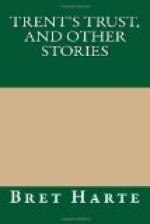him that the unhappy children had variously described
the complexion of their new fellow pupil, and it was
believed that the “No’th’n”
schoolmaster, aided and abetted by “capital”
in the person of Hiram Hoover, had introduced either
a “nigger wench,” a “Chinese girl,”
or an “Injin baby” to the same educational
privileges as the “pure whites,” and so
contaminated the sons of freemen in their very nests.
He was able to reassure many that the child was of
Spanish origin, but a majority preferred the evidence
of their own senses, and lingered for that purpose.
As the hour for her appearance drew near and passed,
he was seized with a sudden fear that she might not
come, that Mr. Hoover had been prevailed upon by his
compatriots, in view of the excitement, to withdraw
her from the school. But a faint cheer from the
bridle path satisfied him, and the next moment a little
retinue swept by the window, and he understood.
The Hoovers had evidently determined to accent the
Spanish character of their little charge. Concha,
with a black riding skirt over her flounces, was now
mounted on a handsome pinto mustang glittering with
silver trappings, accompanied by a vaquero in a velvet
jacket, Mr. Hoover bringing up the rear. He,
as he informed the master, had merely come to show
the way to the vaquero, who hereafter would always
accompany the child to and from school. Whether
or not he had been induced to this display by the
excitement did not transpire. Enough that the
effect was a success. The riding skirt and her
mustang’s fripperies had added to Concha’s
piquancy, and if her origin was still doubted by some,
the child herself was accepted with enthusiasm.
The parents who were spectators were proud of this
distinguished accession to their children’s
playmates, and when she dismounted amid the acclaim
of her little companions, it was with the aplomb of
a queen.
The master alone foresaw trouble in this encouragement
of her precocious manner. He received her quietly,
and when she had removed her riding skirt, glancing
at her feet, said approvingly, “I am glad to
see you have changed your slippers; I hope they fit
you more firmly than the others.”
The child shrugged her shoulders. “Quien
sabe. But Pedro (the vaquero) will help me now
on my horse when he comes for me.”
The master understood the characteristic non sequitur
as an allusion to his want of gallantry on the previous
day, but took no notice of it. Nevertheless,
he was pleased to see during the day that she was paying
more attention to her studies, although they were generally
rehearsed with the languid indifference to all mental
accomplishment which belonged to her race. Once
he thought to stimulate her activity through her personal
vanity.
“Why can you not learn as quickly as Matilda
Bromly? She is only two years older than you,”
he suggested.
“Ah! Mother of God!—why does
she then try to wear roses like me? And with
that hair. It becomes her not.”




